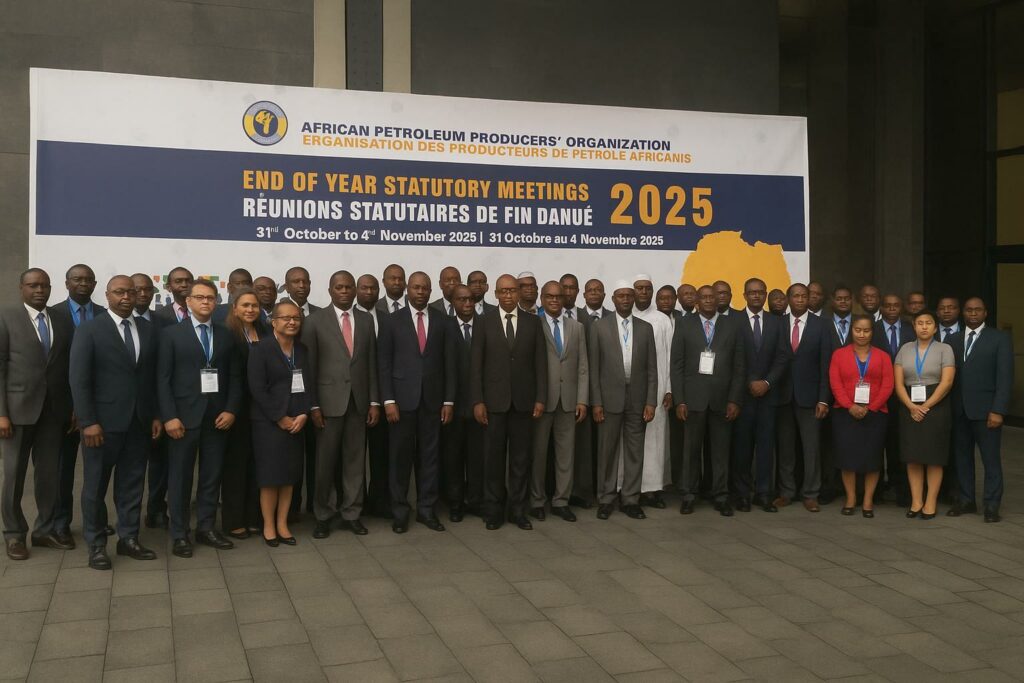Brazzaville Summit Signals Continental Momentum
From 31 October to 4 November 2025 Brazzaville became the epicentre of African hydrocarbon diplomacy as the eighteen member states of the African Petroleum Producers’ Organisation (Appo) gathered for their end-of-year Executive Council and Ministerial Council. Under the chairmanship of Congo’s Minister of Hydrocarbons, Bruno Jean Richard Itoua, delegations assessed the organisation’s trajectory since its 1987 founding in Nigeria and agreed on priorities for 2026. The atmosphere was resolutely forward-looking: delegates portrayed the global energy transition not as an existential threat but as an inflection point that could consolidate African autonomy, provided that financing and technology remain under African control.
An African Energy Bank to Match Ambition
The flagship decision concerns the African Energy Bank (AEB), a joint initiative of Appo and Afreximbank to be headquartered in Abuja. By the first quarter of 2026, according to the organisation’s executive committee, the bank’s first lending windows should be operational. Its mandate is twofold: to cushion member states against the withdrawal of traditional financiers from oil and gas, and to channel resources toward context-appropriate transition technologies. Minister Itoua emphasised that the bank will “anchor our collective interest in the short, medium and long term,” a formulation that mirrors rising calls across Africa for financial institutions able to price risk on the basis of local realities rather than external perceptions.
Financing Sovereignty Amid a Shifting Global Landscape
International investors—particularly European and North American funds—have signalled a strategic retreat from hydrocarbons, spurred by carbon-reduction commitments. For Appo members, whose proven reserves exceed 125 billion barrels of oil and substantial volumes of natural gas, that retreat is double-edged. While it accelerates renewables elsewhere, it can also jeopardise revenues that still anchor national budgets and social programmes. The Brazzaville communiqué therefore frames energy sovereignty as inseparable from financial sovereignty. By mobilising continental capital pools, member states hope to avoid disruptive project cancellations and to negotiate the energy transition on their own timetable, an approach that several analysts describe as “just transition in practice”.
Institutional Reforms Sharpen the Appo Voice
Beyond finance, the organisation endorsed an overhaul of its General Secretariat. Dr Omar Farouk Ibrahim, Secretary-General since January 2020, reported that Appo’s membership has more than doubled in three decades, while its external visibility has expanded markedly. He told ministers that Appo is now “a respected global energy institution” capable of influencing debates that often bypass African perspectives. The Secretariat’s restructuring aims to streamline technical departments, reinforce data analytics, and deepen cooperation with research centres from Algiers to Cape Town, thereby ensuring that policy positions rest on robust evidence rather than advocacy alone.
Key Takeaways for African Producers and Investors
Three signals stand out from the Brazzaville deliberations. First, the appetite for intra-African crude and product exchange is strengthening, with several delegation heads advocating pipeline and shipping corridors that bypass extra-continental hubs. Second, the consensus around gas as a transition fuel remains firm, reflecting its lower carbon intensity and its compatibility with existing power-generation assets. Finally, the forthcoming AEB is conceived not as a stop-gap but as a permanent pillar of continental development finance, potentially complementing entities such as the African Development Bank rather than competing with them.
Regulatory and Economic Outlook
From a regulatory standpoint, ministers reiterated respect for environmental benchmarks articulated in the 2015 Paris Agreement, yet insisted that nationally determined contributions must reflect differentiated responsibilities. Several legal scholars present in Brazzaville underscored that treaty law affords states “latitude in sequencing mitigation measures”, an interpretation that supports phased diversification rather than abrupt divestment. On the economic front, scenarios tabled by the Secretariat envisage that coordinated pricing policies and shared refining capacity could raise intra-African trade in refined products from its current 15 percent to 35 percent within a decade, provided that security and infrastructure bottlenecks are addressed.

